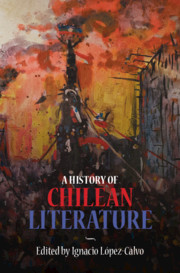Book contents
- A History of Chilean Literature
- A History of Chilean Literature
- Copyright page
- Dedication
- Contents
- Figures
- Contributors
- Acknowledgments
- Introduction
- Part I Proto-Chilean, Colonial Chronicles and Letters
- Part II Nineteenth-Century Articulations of an Embryonic National Consciousness
- Part III Beyond Chileanness: Heterogeneity and Transculturation in Canonical and Peripheral Twentieth- and Twenty-First-Century Literature
- Chapter 12 Gabriela Mistral, Chilean Women Writers, and Intersectionality
- Chapter 13 The Verse as Being in the World
- Chapter 14 Mapuche Poetry
- Chapter 15 The Translation Origins of Literary Mapuche Aesthetics
- Chapter 16 Theatrical Trends and Social Changes in Chile, 1910–2018
- Chapter 17 Jewish Voices, Chilean Literature
- Chapter 18 Chilean Arabic Writing
- Chapter 19 Asian-Chilean Writing and Film, and Chilean Orientalism
- Chapter 20 Croatian-Chilean Literature
- Chapter 21 Chilean-American Writing since September 11, 1973
- Chapter 22 LGBTQ Writing and Cultural Consciousness in Chile
- Chapter 23 Permutations of Selfhood in the Work of José Donoso
- Chapter 24 Isabel Allende, the Post-Boom, and Chilean Exile Literature
- Chapter 25 Roberto Bolaño: His Fiction of History, History of His Fiction
- Chapter 26 Alejandro Zambra and Recent Chilean Narrative
- Chapter 27 Film and Literature in Chile
- Chapter 28 Violence and Memory
- Chpater 29 Chilean Digital Literature
- Chapter 30 Detectives at the End of the World
- Index
- References
Chapter 12 - Gabriela Mistral, Chilean Women Writers, and Intersectionality
from Part III - Beyond Chileanness: Heterogeneity and Transculturation in Canonical and Peripheral Twentieth- and Twenty-First-Century Literature
Published online by Cambridge University Press: 27 September 2021
- A History of Chilean Literature
- A History of Chilean Literature
- Copyright page
- Dedication
- Contents
- Figures
- Contributors
- Acknowledgments
- Introduction
- Part I Proto-Chilean, Colonial Chronicles and Letters
- Part II Nineteenth-Century Articulations of an Embryonic National Consciousness
- Part III Beyond Chileanness: Heterogeneity and Transculturation in Canonical and Peripheral Twentieth- and Twenty-First-Century Literature
- Chapter 12 Gabriela Mistral, Chilean Women Writers, and Intersectionality
- Chapter 13 The Verse as Being in the World
- Chapter 14 Mapuche Poetry
- Chapter 15 The Translation Origins of Literary Mapuche Aesthetics
- Chapter 16 Theatrical Trends and Social Changes in Chile, 1910–2018
- Chapter 17 Jewish Voices, Chilean Literature
- Chapter 18 Chilean Arabic Writing
- Chapter 19 Asian-Chilean Writing and Film, and Chilean Orientalism
- Chapter 20 Croatian-Chilean Literature
- Chapter 21 Chilean-American Writing since September 11, 1973
- Chapter 22 LGBTQ Writing and Cultural Consciousness in Chile
- Chapter 23 Permutations of Selfhood in the Work of José Donoso
- Chapter 24 Isabel Allende, the Post-Boom, and Chilean Exile Literature
- Chapter 25 Roberto Bolaño: His Fiction of History, History of His Fiction
- Chapter 26 Alejandro Zambra and Recent Chilean Narrative
- Chapter 27 Film and Literature in Chile
- Chapter 28 Violence and Memory
- Chpater 29 Chilean Digital Literature
- Chapter 30 Detectives at the End of the World
- Index
- References
Summary
A new generation of readers and scholars of Gabriela Mistral (1889–1957) are reinvigorating her work by using feminist, decolonial, and queer approaches that openly acknowledge her work’s ambivalence regarding feminism and race, map her participation in transatlantic networks, and broaden her corpus through numerous new editions. These new perspectives reject the normative, matriarchal image of Mistral cultivated by the Chilean state and recognize Mistral’s extraordinary experiences as a diplomat and educator in addition to the intersectional nuances of her poetry and nonfiction. Widely read during her lifetime, she was awarded the Nobel Prize for Literature in 1945, the first Latin American author to receive it.
- Type
- Chapter
- Information
- A History of Chilean Literature , pp. 239 - 258Publisher: Cambridge University PressPrint publication year: 2021



